Haiti Moves Towards Adoption of Counter-Trafficking Law


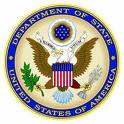 Each year, the U.S. State Department Bureau of Democracy, Human Rights, and Labor is mandated to release country specific human rights reports that address individual, civil, political, and worker rights, as set forth in the Universal Declaration of Human Rights. The 2010 Human Rights Report for Haiti, attached and copied below, indicates much remains to be done. Protecting human rights is a critical element of governance and one which the new administration must take on as institutions and infrastructure are reformed and reconstructed. Protecting human rights will help Haiti become a country that is more fair and just for the whole population, not just the rich and powerful.
Each year, the U.S. State Department Bureau of Democracy, Human Rights, and Labor is mandated to release country specific human rights reports that address individual, civil, political, and worker rights, as set forth in the Universal Declaration of Human Rights. The 2010 Human Rights Report for Haiti, attached and copied below, indicates much remains to be done. Protecting human rights is a critical element of governance and one which the new administration must take on as institutions and infrastructure are reformed and reconstructed. Protecting human rights will help Haiti become a country that is more fair and just for the whole population, not just the rich and powerful.
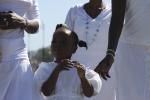 Today marks one year since the earthquake. There has been a great deal of commentary, dialogue, and debate over what is going well, what is not, what should be improved and how. Much of Port au Prince is still in ruins, a cholera epidemic has yet to peak, and the most recent elections were a debacle. The anniversary provides an opportunity for us to consider what will get Haiti out of survival mode and on the path to development. Doing so will depend in large part upon the Haitian government, its willingness to change, and ability to lead.
Today marks one year since the earthquake. There has been a great deal of commentary, dialogue, and debate over what is going well, what is not, what should be improved and how. Much of Port au Prince is still in ruins, a cholera epidemic has yet to peak, and the most recent elections were a debacle. The anniversary provides an opportunity for us to consider what will get Haiti out of survival mode and on the path to development. Doing so will depend in large part upon the Haitian government, its willingness to change, and ability to lead.
 Haiti is in the midst of a cholera outbreak, the origin of which is and may remain unclear. We live in a mobile world and the source could be Africa, Asia, South America, or it may have already been in the environment. Where it came from is less important than the fact that Haiti, and especially the poorest of the poor, will always be vulnerable without clean water, adequate sanitation, and good hygiene. This is an update on the current cholera emergency and a reflection on actions that can prevent this from happening again.
Haiti is in the midst of a cholera outbreak, the origin of which is and may remain unclear. We live in a mobile world and the source could be Africa, Asia, South America, or it may have already been in the environment. Where it came from is less important than the fact that Haiti, and especially the poorest of the poor, will always be vulnerable without clean water, adequate sanitation, and good hygiene. This is an update on the current cholera emergency and a reflection on actions that can prevent this from happening again.
 The transition from emergency relief to reconstruction is happening, albeit slowly. It won’t be easy and there will be setbacks, particularly given that the rainy season is upon us along with the risks it brings of flooding, mudslides, infectious diseases, and infrastructure damage. Engineers have completed emergency mitigation measures at six of the most vulnerable settlements to protect the most vulnerable, but much remains to be done.
The transition from emergency relief to reconstruction is happening, albeit slowly. It won’t be easy and there will be setbacks, particularly given that the rainy season is upon us along with the risks it brings of flooding, mudslides, infectious diseases, and infrastructure damage. Engineers have completed emergency mitigation measures at six of the most vulnerable settlements to protect the most vulnerable, but much remains to be done.
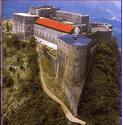 Hello from Cap Haitian, the chipped pearl of the Antilles. When I was a Peace Corps Volunteer in the Central Plateau, I would sometimes take Route National Three from Hinche to Cap for a long weekend. I never looked forward to the grueling trip, but I always looked forward to being in Cap. The beaches were (and still are) beautiful and this region is historically rich. It is here that Christopher Columbus landed and where he lost one of his ships. The Haitian slave rebellion began with a single Vodoun ceremony in Bois Cayman and ended with the battle of Vertieres. The Citadel looms from a mountain in the distance. While the city of Cap Haitian has changed, and not for the better, it is still good to be back in the north.
Hello from Cap Haitian, the chipped pearl of the Antilles. When I was a Peace Corps Volunteer in the Central Plateau, I would sometimes take Route National Three from Hinche to Cap for a long weekend. I never looked forward to the grueling trip, but I always looked forward to being in Cap. The beaches were (and still are) beautiful and this region is historically rich. It is here that Christopher Columbus landed and where he lost one of his ships. The Haitian slave rebellion began with a single Vodoun ceremony in Bois Cayman and ended with the battle of Vertieres. The Citadel looms from a mountain in the distance. While the city of Cap Haitian has changed, and not for the better, it is still good to be back in the north.
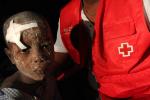 The suffering caused by the earthquake is difficult to fully comprehend. Haitian authorities report that at least 72,000 bodies have been recovered. Some predict the final death toll will be as high as 150,000 in Port au Prince alone. Up to 1.5 million people may be homeless. ICRC reports approximately 55,000 people in 40 informal temporary camps throughout the city. As you read this, many people are going back to the countryside. While most of the damage took place in the southern portion of Haiti, the whole country will be affected. The Government has declared a period of national mourning until February 17. We all grieve for what Haiti has lost.
The suffering caused by the earthquake is difficult to fully comprehend. Haitian authorities report that at least 72,000 bodies have been recovered. Some predict the final death toll will be as high as 150,000 in Port au Prince alone. Up to 1.5 million people may be homeless. ICRC reports approximately 55,000 people in 40 informal temporary camps throughout the city. As you read this, many people are going back to the countryside. While most of the damage took place in the southern portion of Haiti, the whole country will be affected. The Government has declared a period of national mourning until February 17. We all grieve for what Haiti has lost.
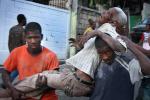 Immediately after the earthquake, the main source of information was Twitter, which I have a new respect for. Journalists and aid workers are arriving in Haiti and we are gaining a better sense of just how extensive the damage to Port au Prince is. We also know that Jacmel was seriously affected as well. Aid from the United States, other governments, and humanitarian responders both big and small is picking up. This is a summary of the current situation, who is doing what where, and how you can help. Additional updates will be posted as comments.
Immediately after the earthquake, the main source of information was Twitter, which I have a new respect for. Journalists and aid workers are arriving in Haiti and we are gaining a better sense of just how extensive the damage to Port au Prince is. We also know that Jacmel was seriously affected as well. Aid from the United States, other governments, and humanitarian responders both big and small is picking up. This is a summary of the current situation, who is doing what where, and how you can help. Additional updates will be posted as comments.
 In the article below, Jacqueline Charles of the Miami Herald writes how, despite Haiti's many challenges, roads are being built, power plants constructed, and business opportunities growing. Investments in Haiti - in the capacity of its government, in its infrastructure, and increasingly in its private sector, are starting to pay off. Haiti is a country under construction, with something that it has not had for years...momentum.
In the article below, Jacqueline Charles of the Miami Herald writes how, despite Haiti's many challenges, roads are being built, power plants constructed, and business opportunities growing. Investments in Haiti - in the capacity of its government, in its infrastructure, and increasingly in its private sector, are starting to pay off. Haiti is a country under construction, with something that it has not had for years...momentum.
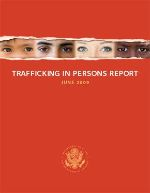 Human trafficking is a global problem that affects every country in the world. Last week, the U.S. State Department released its 2009 annual report on how well partner governments are preventing and responding to human trafficking. Understanding trafficking in Haiti requires understanding the situation in the Dominican Republic. Neither country complies with minimum standards for eliminating trafficking, although both governments acknowledge the need to do more. This is an issue that clearly requires cross-border collaboration.
Human trafficking is a global problem that affects every country in the world. Last week, the U.S. State Department released its 2009 annual report on how well partner governments are preventing and responding to human trafficking. Understanding trafficking in Haiti requires understanding the situation in the Dominican Republic. Neither country complies with minimum standards for eliminating trafficking, although both governments acknowledge the need to do more. This is an issue that clearly requires cross-border collaboration.